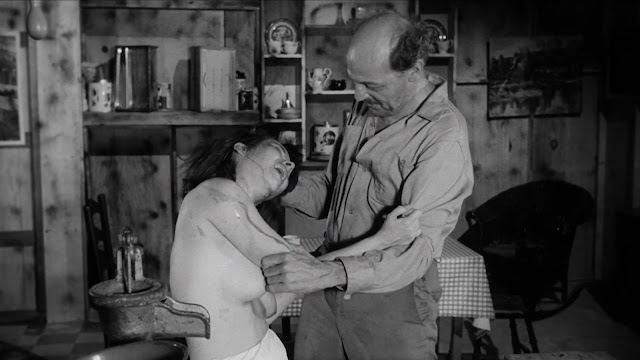Shanty Tramp (Joseph G. Prieto, 1967)
Respect to Nicolas Winding Refn for curating and restoring a bunch of lost films from the dingy annals of B-movie cinema. Joseph G. Prieto's extreme slice of Southern Gothic melodrama, Shanty Tramp (1967) is one such forgotten entry. Bereft of a modest budget, and a cast possessing an ounce of acting talent, the film is a riveting viewing experience, thanks to its gritty atmosphere and a sleazy plot that chaotically descends into unexpected and shocking direction. This exploitation cinema of its era that still packs some potency today.
Emily Stryker (Eleanor Vaill; credited as Lee Holland) is the titular scrubber in question, and much like the the Rising Sun, has been the ruin of many a poor boy. From the God fearing simpleton to the corrupt and sleazy minister; Emily gets a kick out of teasing men and having them lusting over her. Bizarrely, she hardly looks the southern belle type like Daisy Duke, therefore, it's both equally amusing and perplexing watching men fawning all over her. Despite Vaill's only landing the lead for her nonchalance in getting her kit off. She's surprisingly convincing delivering the odd line or two.

The film's opening titles has the titular character strutting her stuff while a bombastic rendition of the hymn When the Saints Go Marching In is sung. Sardonically, it sets the tone of the film, as male bar patrons ogle at Emily's round derrière. The song gets rinsed again once it jumps to Preacher Fallows (Bill Rogers), the travelling minister, swindling his geriatric congregation to chip in some dough for his collection basket. Unsurprisingly, the conman evangelist has carnal desires for the flirtatious floozy attending his night time sermon and wants to show her "the power and the glory!" in the back of his caravan.
Despite warnings from his religious mother, country bumpkin Daniel Smith
(Lewis Galen) falls victim to the tawdry thirst trap. Like a knight in
shining armour, he rescues the wicked wench from a potentially serious
encounter involving the Chuck Connors-lookalike biker Savage (Lawrence Tobin). Unbeknown to Daniel, there's a revenge attack at his home while he's busy gooning for
the salacious stop-out. Succumbing to Emily's
temptations in a barn, he quickly regrets slapping cheeks with the
heinous harlot as the pair are caught by her drunken white trash of a
father (Otto Schlessinger; credited as Kenneth Douglas). "Blasphemy!"
he yells. Falsely crying she was raped, Daniel is now on the run. Since
Daniel is black, and Shanty Tramp is set in a Dixie town, you can put two and two together and see where this is headed.
Worth noting Shanty Tramp was released in the same year as other and more familiar Southerns: the racially charged In the Heat of the Night and the prison drama Cool Hand Luke. The micro-budgeted Shanty Tramp isn't anywhere near the level of competency of those two films. However, it does have them beat with a whole array of Southern preconceptions of the region. Nearly every southern film cliché is check marked: the trashy temptress; the inebriated and abusive patriarch; rampant racism; the innocent black victim; the police manhunt, replete with tracker dogs; the bible thumping evangelist; the moonshine distillery in a rickety shack; the elderly eccentric with an Old Testament sounding name, like Ichabod or Jeremiah. All of those elements are herein, painting a rich canvas.
Some flaws, like the unprofessional actors' bad performances, don't inadvertently lend to the film's charm. An important loose end involving Savage's biker gang is left completely unresolved. Without giving away too much, it's a crucial element, which was either edited out, or completely forgotten about during the writing process. Much of the dialogue sounds like it was recorded in a bathroom during post-production; it's out of sync with the actors' lips. There are also noticeable jumps in some of the dialogue scenes, which suggests that some of the derogatory racist language might have been edited out, although, according to Refn's restorationists, there doesn't seem to be a stronger cut of the film in existence. It is jarring in the film, however.
The cast might be relative unknowns, but Shanty Tramp's director is a name I'm somewhat familiar with, having seen Joseph P. Prieto's feverishly bizarre horror Miss Leslie's Dolls (1973). What's puzzling about this director is he might be an alias to Joseph P. Mawra; the director who helmed the notorious Olga roughies from the sixties. Although, there's no solid confirmation available online to confirm this, Google and MUBI lists Mawra instead of Prieto as Shanty Tramp's director. What is for certain is Shanty Tramp's second unit director is none other than Bob Clark; who went on to direct personal faves Black Christmas (1974), Murder by Degree (1979) and Porky's (1981).
Unsurprisingly, Shanty Tramp never earned any plaudits for its handling of social political issues; especially ones engrained in America's turbulent racial history. Realistically speaking, the film was made to court controversy in the aid of getting bums on seats. Almost sixty years on, and it still packs some punch to the easily offended today. However, for those of a less sensitive disposition, Shanty Tramp excels at weaving an entertaining exploitation romp; comparable to southern trash masterpieces Two Thousand Maniacs! (1964) and Mudhoney (1965). For this reason alone, Shanty Tramp is an uncouth, yet beguiling film that is definitely worth checking out.







No comments:
Post a Comment